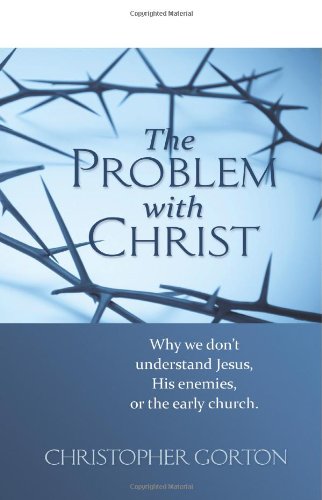Book review: The Problem with Christ
by Christopher Gorton
★★★★★
Don’t worry, there’s nothing wrong with Jesus. What irks Gorton is the way we misuse the title Christ.
“Christ” is a transliteration, not a translation. That means it is a made-up word replacing the Greek word Christos, meant to sound the same rather than provide meaning. So, we’re left on our own to figure out what it means.
Unfortunately, we’ve guessed wrong, aided by horrible translations. We’ve turned Christ into a last name. It’s not a name at all, but a title; it means Lord, or Messiah, or Anointed. Or, better yet, Gorton argues that the most accurate and meaningful translation of all is the simple word King. He is so serious about this that he requests we drop the title Christ, for those who claim to truly follow Him should no longer use a meaningless term. Better to replace “Jesus Christ” with “King Jesus” in our speech, or at the very least insert the definitive article “the”: Jesus the Christ.
Christopher isn’t suggesting we degrade Jesus by pretending he is just any old king—he is the prophesied king of the age of God’s rule—but it’s still helpful to understand what it means for Jesus to be anointed (for that’s the most literal translation of “Christ”). It means to be proclaimed the son of God, a king over God’s people, just as it did all through the Old Testament. Gorton points out that King David saw himself as the messiah and the son of God; the christos of his era. Moving on to the second half of the Bible, then, Gorton concludes that “in every occurrence of christos in the New Testament, it was the author’s intention that it be understood as the title king, and that christos was never understood as a name!”
I struggled a bit deciding my rating for this book, even though I enjoyed reading it a great deal, and finally settled upon a full five-star review. Yet I have two problems with the book.
First, Gorton is right, and I know no scholars who will argue. His thesis is no startling new revelation; maybe I’m betraying my nerdiness a bit, but I should think that anyone who reads books like this one already knows that Christ means King, and when Christians called Jesus the Christ, they were hailing him as God’s anointed king. So, while Gorton writes as if this is a controversial discovery, he is actually preaching to the choir a bit, though his research is thorough and appreciated.
My second problem is that, even though Gorton is right, I don’t like it. It’s true, the word “king” describes precisely how many viewed Jesus, because that was the dream the Jews held for their Messiah: they wanted a David-like king to set the world right again. While there was much argument over what exactly it meant back in the first century to call Jesus “king,” and what the kingdom was supposed to be like, just take a gander at the book of Revelation if you don’t think any first-century Christians wanted a literal, this-worldly, political figure as their Messiah. Christians in the first century were adamant: they would not bow down to Caesar; they had no king but Jesus. But to me, “King Jesus” sounds too earthly, too literal and restrictive, describing the very type of king that Jesus refused to be. I’ll compromise with Jesus the Christ.












 354 Circles
354 Circles
 603 Goodreads Friends & Fans
603 Goodreads Friends & Fans

 Hello! I'm an author, historical Jesus scholar, book reviewer, and liberal Christian, which means I appreciate and attempt to exercise the humanitarian teachings of Jesus without getting hung up on any particular supernatural or religious beliefs.
The Bible is a magnificent book that has inspired and spiritually fed generations for thousands of years, and each new century seems to bring a deeper understanding of life’s purpose. This is true of not only Christianity; through the years, our age-old religions are slowly transforming from superstitious rituals into humanitarian philosophies. In short, we are growing up, and I am thrilled to be riding the wave.
I avidly read all thought-provoking religion titles. New authors: I'd love to read and review your book!
Hello! I'm an author, historical Jesus scholar, book reviewer, and liberal Christian, which means I appreciate and attempt to exercise the humanitarian teachings of Jesus without getting hung up on any particular supernatural or religious beliefs.
The Bible is a magnificent book that has inspired and spiritually fed generations for thousands of years, and each new century seems to bring a deeper understanding of life’s purpose. This is true of not only Christianity; through the years, our age-old religions are slowly transforming from superstitious rituals into humanitarian philosophies. In short, we are growing up, and I am thrilled to be riding the wave.
I avidly read all thought-provoking religion titles. New authors: I'd love to read and review your book!
 Hi! While Lee writes the articles and reviews the books, I edit, organize, and maintain the blog. The views expressed here are Lee's but I'm his biggest supporter! :-)
Hi! While Lee writes the articles and reviews the books, I edit, organize, and maintain the blog. The views expressed here are Lee's but I'm his biggest supporter! :-)
Connect With Me!